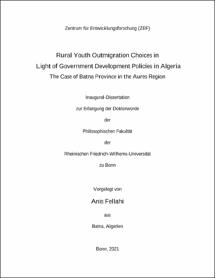Fellahi, Anis: Rural Youth Outmigration Choices in Light of Government Development Policies in Algeria : The Case of Batna Province in the Aures Region. - Bonn, 2021. - Dissertation, Rheinische Friedrich-Wilhelms-Universität Bonn.
Online-Ausgabe in bonndoc: https://nbn-resolving.org/urn:nbn:de:hbz:5-60963
Online-Ausgabe in bonndoc: https://nbn-resolving.org/urn:nbn:de:hbz:5-60963
@phdthesis{handle:20.500.11811/8922,
urn: https://nbn-resolving.org/urn:nbn:de:hbz:5-60963,
author = {{Anis Fellahi}},
title = {Rural Youth Outmigration Choices in Light of Government Development Policies in Algeria : The Case of Batna Province in the Aures Region},
school = {Rheinische Friedrich-Wilhelms-Universität Bonn},
year = 2021,
month = feb,
note = {Rural unemployment and underemployment in developing countries are one of the most salient factors driving youth outmigration. In Algeria, as in many countries in the Global South, while migration to Europe remains a far-fetched dream for the majority of young people (due to the increasing restrictiveness), internal migratory flows become more and more intense. The ramifications of this human mobility are overemphasized in the migration literature, including the loss of significant manpower in rural areas, in combination with congested cities that grapple with meeting the social services of the newcomers. Conventional wisdom is that more development will lead to less migration. However, the debate on the nexus between migration and development is still ongoing, especially with migration becoming a priority in the agenda of policy makers and development practice. This qualitative study adopts the system theory on migration embedded in an analysis of social transformation processes to address the migration choices of the rural youth in the province of Batna in the Aures region in northeastern Algeria. In-depth interviews with rural migrants and non-migrants, expert interviews, and informal discussions were employed. In order to serve the purpose of triangulating some key aspects, self-completed questionnaires were also distributed. Findings suggest that potential migrants use their social networks to seek informal employment in the city or elsewhere in an ad hoc fashion. Furthermore, the main development initiatives by the government namely Ansej, agricultural support, and rural housing subsidies are laden with structures. Coupled with an ingrained tradition of buying social peace, such interventions are preordained to have a limited scope. In addition to a largely marginalized rural youth, the development policy inadvertently brings about a sense of relative deprivation among non-beneficiaries, which could in turn affect the traditional rural organization for both the family and the village. Not only do these inaccurate development policy prescriptions culminate in the continuation of a system of migration ad infinitum, but also other structural and institutional factors play a significant role. For both migrants and non-migrants, several “thinning” factors affect the human agency in rural areas in Batna, including landlessness, inadequate education, and gerontocracy.},
url = {https://hdl.handle.net/20.500.11811/8922}
}
urn: https://nbn-resolving.org/urn:nbn:de:hbz:5-60963,
author = {{Anis Fellahi}},
title = {Rural Youth Outmigration Choices in Light of Government Development Policies in Algeria : The Case of Batna Province in the Aures Region},
school = {Rheinische Friedrich-Wilhelms-Universität Bonn},
year = 2021,
month = feb,
note = {Rural unemployment and underemployment in developing countries are one of the most salient factors driving youth outmigration. In Algeria, as in many countries in the Global South, while migration to Europe remains a far-fetched dream for the majority of young people (due to the increasing restrictiveness), internal migratory flows become more and more intense. The ramifications of this human mobility are overemphasized in the migration literature, including the loss of significant manpower in rural areas, in combination with congested cities that grapple with meeting the social services of the newcomers. Conventional wisdom is that more development will lead to less migration. However, the debate on the nexus between migration and development is still ongoing, especially with migration becoming a priority in the agenda of policy makers and development practice. This qualitative study adopts the system theory on migration embedded in an analysis of social transformation processes to address the migration choices of the rural youth in the province of Batna in the Aures region in northeastern Algeria. In-depth interviews with rural migrants and non-migrants, expert interviews, and informal discussions were employed. In order to serve the purpose of triangulating some key aspects, self-completed questionnaires were also distributed. Findings suggest that potential migrants use their social networks to seek informal employment in the city or elsewhere in an ad hoc fashion. Furthermore, the main development initiatives by the government namely Ansej, agricultural support, and rural housing subsidies are laden with structures. Coupled with an ingrained tradition of buying social peace, such interventions are preordained to have a limited scope. In addition to a largely marginalized rural youth, the development policy inadvertently brings about a sense of relative deprivation among non-beneficiaries, which could in turn affect the traditional rural organization for both the family and the village. Not only do these inaccurate development policy prescriptions culminate in the continuation of a system of migration ad infinitum, but also other structural and institutional factors play a significant role. For both migrants and non-migrants, several “thinning” factors affect the human agency in rural areas in Batna, including landlessness, inadequate education, and gerontocracy.},
url = {https://hdl.handle.net/20.500.11811/8922}
}






